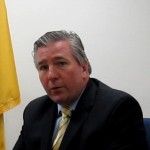 Bipartisan legislation sponsored by Assembly Republican Conference Leader Dave Rible and Sen. Jennifer Beck to create a task force to improve the funding, delivery and effectiveness of special education programs and services in New Jersey was signed into law today by Governor Christie.
Bipartisan legislation sponsored by Assembly Republican Conference Leader Dave Rible and Sen. Jennifer Beck to create a task force to improve the funding, delivery and effectiveness of special education programs and services in New Jersey was signed into law today by Governor Christie.
“This is a victory for the hundreds of parents I’ve met while visiting schools and special education programs who feel that their kids are falling through the cracks,” Rible, R-Monmouth and Ocean, said. “We can’t walk away from these families and this task force will examine everything to make special education more efficient and effective in a meaningful reform of our system that will benefit our special needs children.
“This is one of the most emotional issues I’ve been involved in, and I’m gratified that Governor Christie signed this bill,” Rible added.
“As we look to reform and improve education throughout the state we cannot ignore our special needs students,” explained Beck, R-Monmouth. “Numerous inconsistencies have been uncovered in special education programs throughout the state. Millions of dollars are being wasted every year on inefficient and ineffective special education programs. Every student is valuable and deserves the best we can provide, but this can be accomplished in a much more efficient manner.”
The Task Force on Improving Special Education for Public School Students will study various issues including:
Methods of classifying and education special needs students.
Best practices for special education.
Strategies to reduce costs associated with out-of-district placements.
Standards to ensure programs meets students’ needs and focus on achievement.
The task force will consist of the state Education Commissioner and 16 members appointed by the Governor, included parents, teachers, administrators and advocates involved in the special education community. The task force has 180 days after it organizes to present its findings and recommendations.
The bipartisan legislation was also prime-sponsored by Assembly members Mary Pat Angelini, Jason O’Donnell and Donna Simon, and Sen. Teresa M. Ruiz. TLS.

The first thing they should do is look at the 2011 Augenblick, Palaich and Associates report commissioned by the NJ Dept. of Ed. They reported:
“ (1) New Jersey might need to consider funding special education based on the actual enrollment of special education students in districts and (2) the state might need to consider some differentiation of funding for higher cost students before the extraordinary aid threshold is reached.”
Trenton will pay only 1/7 the cost of every single Lakewood child that opts for a Free and Appropriate Public Education (FAPE) either through SCHI or through my vision of bringing an FAPE to the place of the child. This is because the state does not fund each individual student but uses a census-count that uses public school enrollment and funds 1/7 of that count. This is highly prejudicial and probably unconstitutional as applied to Lakewood where thousands need services but funding is 1/7 of the tiny public school count.
Also, Lakewood has a high number of children receiving extraordinary aid. Lakewood taxpayers have to cover $55,000 before the state begins to cover the expense at all.
Why should the government i.e. us the taxpayers, pay for the cost of special and private education. If these children need special education or private education let families or charities bare the burden. A free basic education is provided for them in the public schools, if they need more help or don’t want to attend public school let their families go out and work to pay for it. I work hard for my money as do many others so why should we pay for your child, we have our own children to worry about. We’re giving poor people free housing they didn’t earn and now you want to give free specialized and private education, let families or charities bare the costs.
Also, let me add, the NJ education budget is set by the legislature every year. The School Funding Reform Act (SFRA) is rarely fully funded so that every district does not actually get its true SFRA set amount per child. Whatever funding the legislature determines for that year, unless there is a court challenge, which now is unlikely, is then divided among NJ’s 590 districts. If one gets more the other gets less.
I do not see why one district is more worthy than another that Lakewood should not get its fair share . Nobody’s state taxes are raised. Just nobody’s federal taxes were raise when BOE decided to take $5 million in Title I funding from yeshiva kids and used it for public school children to supplement their budget under the school wide program. Your taxes did not go up.